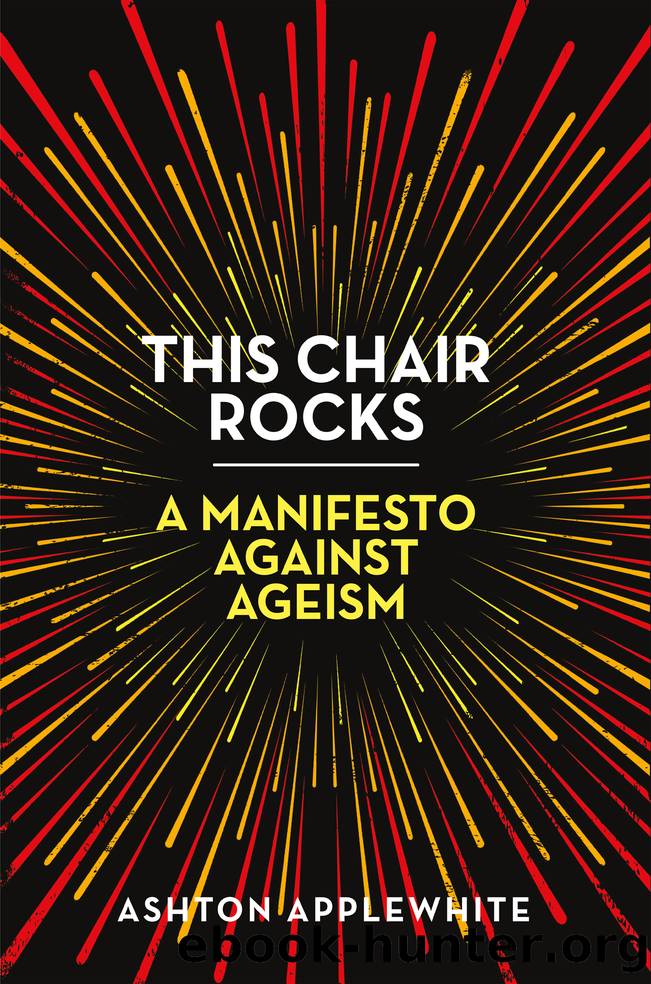This Chair Rocks by Ashton Applewhite

Author:Ashton Applewhite
Language: eng
Format: epub
Publisher: Celadon Books
CHAPTER SIX
NOT DONE YET: THE WORKPLACE
Older Americans are damned if we work and damned if we don’t. If we stay on the job, we’re criticized for taking jobs away from younger people. (Economists call that the “fixed lump of labor” fallacy.) If we step off the treadmill, we’re branded “greedy geezers” for sucking up more than our share of resources, letting younger workers support us, and leaving nothing in the pot for the next generation’s golden years. (The old-age dependency ratio rears its ugly head again.) And we’re damned if we’re laid off, because experience is a liability in an ageist world. Ageism handicaps younger workers too. Millennials are criticized for having no work ethic and needing their hands held, and recent graduates with no track records face higher unemployment rates than older workers.
But once out of a job, workers like Arynita Armstrong have a much harder time finding another one. “They just see gray hair and they write you off,” said the sixty-year-old from Willis, Texas, who’d been looking for work since losing her job at a mortgage company five years earlier. “They’re afraid to hire you, because they think you’re a health risk. You know, you might make their premiums go up. They think it’ll cost more money to invest in training you than it’s worth it because you might retire in five years. Not that they say any of this to your face,” she added.
Also quoted in this front-page article in The New York Times was Susan Zimmerman, who said starkly, “If I break my wrist, I lose my house.”1 The sixty-two-year-old freelance writer in Cleveland worked three part-time jobs and had pieced together a regimen of home remedies that she hoped would keep her healthy until Medicare kicked in. In order to hold on to her house she’d had to start taking Social Security benefits early, which means she’ll receive 30 percent less for the rest of her life than if she’d been able to hold off till age sixty-six.
Olders who find a new job make on average 20 percent less than they’d been earning—the biggest income loss for any age-group, according to the Bureau of Labor Statistics.2 They’re also more likely to have been laid off from industries that are downsizing and more likely to have some sort of disability that limits their options. Many never regain their former standard of living, not to mention their sense of personal and professional worth. Most will live for at least another two decades. Bankruptcies are booming among older Americans, more of whom—especially low-income households—are carrying more debt in larger amounts than earlier generations.3
Ageism prevents older workers from finding challenging work of which they’re eminently capable, and relegates them to jobs that all too often neglect to take advantage of their skills and experience—Walmart greeters, say. Those who do get hired are increasingly funneled into what a 2016 study out of the Center for Retirement Research dubbed “old-person” jobs.4 A mix of high-skilled service work (like managers, sales
Download
This site does not store any files on its server. We only index and link to content provided by other sites. Please contact the content providers to delete copyright contents if any and email us, we'll remove relevant links or contents immediately.
| General | Discrimination & Racism |
Nudge - Improving Decisions about Health, Wealth, and Happiness by Thaler Sunstein(6633)
iGen by Jean M. Twenge(4702)
The Fire Next Time by James Baldwin(4341)
Adulting by Kelly Williams Brown(3667)
The Sports Rules Book by Human Kinetics(3585)
The Hacking of the American Mind by Robert H. Lustig(3579)
The Ethical Slut by Janet W. Hardy(3500)
Captivate by Vanessa Van Edwards(3295)
Mummy Knew by Lisa James(3166)
In a Sunburned Country by Bill Bryson(2945)
Ants Among Elephants by Sujatha Gidla(2923)
The Worm at the Core by Sheldon Solomon(2916)
Suicide: A Study in Sociology by Emile Durkheim(2609)
The Slow Fix: Solve Problems, Work Smarter, and Live Better In a World Addicted to Speed by Carl Honore(2574)
Humans of New York by Brandon Stanton(2378)
Handbook of Forensic Sociology and Psychology by Stephen J. Morewitz & Mark L. Goldstein(2376)
Blackwell Companion to Sociology, The by Judith R. Blau(2316)
The Happy Hooker by Xaviera Hollander(2273)
Outliers by Malcolm Gladwell(2255)
